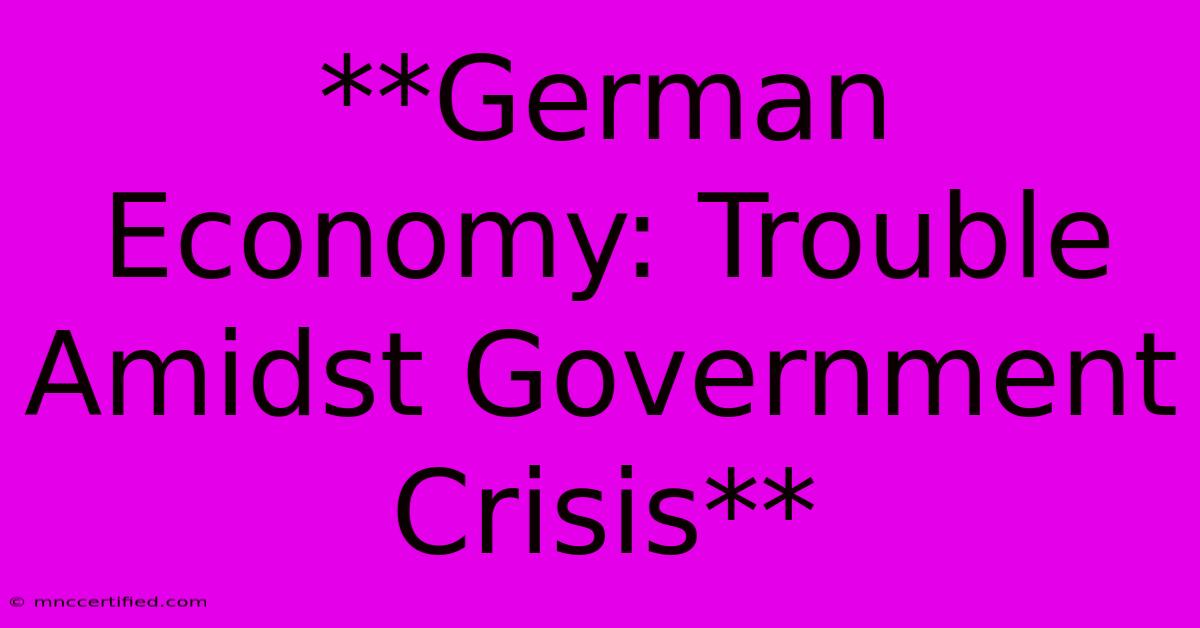**German Economy: Trouble Amidst Government Crisis**

Table of Contents
German Economy: Trouble Amidst Government Crisis
The German economy, long considered a pillar of stability in Europe, is facing turbulent times. A perfect storm of global challenges, coupled with a protracted political impasse, is casting a shadow over the nation's economic outlook.
A Symphony of Challenges
The German economy is grappling with a multitude of headwinds:
- Inflationary Pressures: Like many other countries, Germany is experiencing soaring inflation, fueled by the war in Ukraine, supply chain disruptions, and surging energy prices. This is squeezing consumer spending and eroding business confidence.
- Energy Crisis: Germany's heavy reliance on Russian energy has left it vulnerable to the energy crisis. The government's efforts to diversify its energy supply are taking time, and the impact on businesses and households remains significant.
- Global Slowdown: The global economy is facing a period of slowing growth, with the war in Ukraine, rising interest rates, and China's economic slowdown casting a pall over global trade. This is impacting Germany's export-driven economy.
Political Impasse Adds to the Woes
Adding to the economic woes is the ongoing political crisis in Germany. The three-party coalition government is struggling to maintain unity, with disagreements on key issues, including energy policy and defense spending, threatening to derail crucial economic decisions.
- The Greens' Dilemma: The Greens, a key coalition partner, are facing pressure to balance their environmental agenda with the need for energy security. Their reluctance to approve new fossil fuel projects is creating tension within the government.
- Defense Spending Debate: The debate over increasing defense spending, prompted by Russia's invasion of Ukraine, has further deepened divisions within the coalition. This is delaying critical decisions on bolstering Germany's military capabilities and its role in European security.
The Economic Outlook: A Balancing Act
Despite the challenges, the German economy is not expected to fall into recession. However, growth is expected to be sluggish in the coming months, with the potential for a deeper downturn if the political crisis deepens or the global economic outlook deteriorates further.
What's Next?
The German government is under pressure to address the economic challenges and navigate the political impasse. Key steps include:
- Accelerating Energy Diversification: Germany needs to expedite its transition to renewable energy sources while ensuring short-term energy security. This could involve exploring new partnerships and accelerating the deployment of renewable energy infrastructure.
- Supporting Businesses and Households: Targeted measures are needed to help businesses cope with rising energy costs and support vulnerable households facing inflation.
- Restoring Political Stability: The coalition government needs to find common ground on key issues to ensure policy coherence and stability.
The future of the German economy hangs in the balance. The ability of the government to address the challenges effectively and navigate the political storm will determine whether Germany can maintain its position as a leading economic power.

Thank you for visiting our website wich cover about **German Economy: Trouble Amidst Government Crisis**. We hope the information provided has been useful to you. Feel free to contact us if you have any questions or need further assistance. See you next time and dont miss to bookmark.
Featured Posts
-
North Koreans Online First Access Early Impacts
Nov 08, 2024
-
Shetland Back On Track After Jensen Takeover
Nov 08, 2024
-
What Hospitals Accept Ambetter Insurance
Nov 08, 2024
-
National Family Assurance Life Insurance
Nov 08, 2024
-
Mark Robins Fired Coventry Citys Loss
Nov 08, 2024